|
|
| |
PORTUGAL
USEFUL INFORMATION
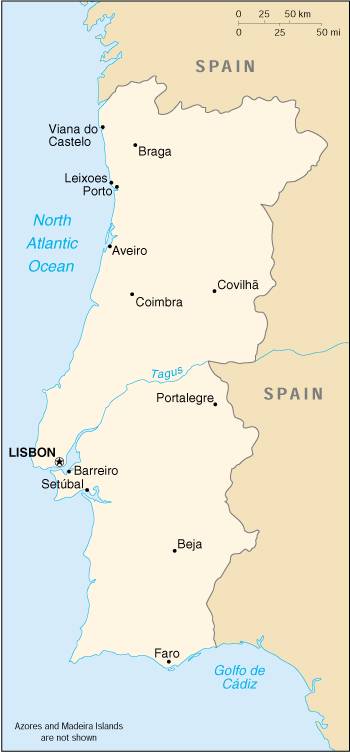 ...There are few countries of Portugal's size that boast such a diversity of landscapes from the lush green valleys of the north and the clean golden beaches of the south, to the subtropical island of Madeira and the vibrant capital of Lisbon...
Location:
Portugal is located on the west of the Iberian Peninsula: its land borders are with Spain and it has a long Atlantic coastline. The islands of Madeira and the Azores (a group of nine islands) belong to Portugal.
Area:
92,391 sq km
Neighbouring countries:
Spain 1,214 km
Coastline:
1,793 km
Climate:
Portugal has a mild climate without extremes of temperature. Winters are never too cold and summers are always moderately hot.
The North has an Atlantic climate influenced by the Gulf Stream. The Centre has gentle dry summers and short mild winters. The South has a warm, dry Mediterranean climate without extremes of heat. Madeira offers a pleasant climate all year round. The Azores also offers mild weather tempered by the Atlantic.
Elevation extremes:
Lowest point: Atlantic Ocean 0 m,
highest point: Ponta do Pico (Pico or Pico Alto) on Ilha do Pico in the Azores 2,351 m
Population:
10,066,253 (July 2001 est.)
Ethnic groups:
Homogeneous Mediterranean stock; citizens of black African descent who immigrated to mainland during decolonization number less than 100,000
Religions:
Roman Catholic 94%, Protestant (1995)
Languages:
Portuguese
Getting to Portugal:
By plane There are international airports at Lisbon, Oporto, Faro, Funchal (Madeira), Ponta Delgada (São Miguel Island-Azores) and Lages (Terceira Island-Azores). The national airlines are TAP Air Portugal and Portugalia.
By train Daily international trains run between Paris-Lisbon (Sud Express), crossing the frontier at Vilar Formoso; between Lisbon-Madrid, crossing the frontier at Marvão; and between Oporto-Vigo, crossing the frontier at Valença. Portuguese Railroads.
By coach There are three companies running services between many European cities and Oporto (Inter-Norte), Lisbon (Inter-Centro) and Faro (Inter-Sul).
Passports and visas:
Portugal is a signatory to the 1995 Schengen Agreement.
Visas are required by all except the following for stays of up to 90 days:
(a) nationals of EU countries, Australia, Canada, USA, Japan and nationals of Iceland, Liechtenstein, Malta, Norway and Switzerland holding valid national ID cards.
(b) nationals of Andorra, Argentina, Bolivia, Brazil, Brunei, Bulgaria, Chile, Costa Rica, Croatia, Cyprus, Czech Republic, Ecuador, El Salvador, Estonia, Guatemala, Honduras, Hungary, Israel, Korea (Rep. of), Latvia, Lithuania, Malaysia, Mexico, Monaco, New Zealand, Nicaragua, Panama, Paraguay, Poland, San Marino, Singapore, Slovak Republic, Slovenia, Switzerland, Uruguay, Vatican City and Venezuela;
(c) transit passengers continuing their journey by the same or first connecting aircraft, provided holding onward or return documentation and not leaving the airport. However, nationals of certain countries always require a transit visa, even when not leaving the airport transit area; contact the Consulate (or Consular section at Embassy) for details.
For up to date rules that apply for your home country we advise you to contact the nearest Portuguese Embassy or Consulate for further information.
Customs regulations:
You must be at least 20 years of age to bring in spirits and at least 18 to bring in wine, beer, cigarettes and tobacco. Up to 3 kilos of meat may be brought in from EEA countries. The meat must be stamped with the country of origin.
You are not permitted to bring in fresh fruits, vegetables or dairy products. You may only bring medicine for your personal use, and you should have a letter from your doctor attesting to your need for the medicine.
Health and safety:
Medical assistance is available in hospitals providing 24 hours a day emergency service. There are also many clinics open from 8 a.m. to 8 p.m. In case of emergency dial the number 115. In case of road accident use the nearest SOS phone (orange). For further information see Phone Directory.
Chemists are open 9 a.m. - 1 p.m. /3 p.m. - 7 p.m. Monday to Friday and Saturday mornings. In every area, you can always find one that is open all night or on Sunday. See the sign on the door (white cross on green background) to find your nearest chemist. The Portuguese word for chemist is "Farmácia".
Time:
Portugal time is Greenwich Mean (GMT) time except for Madeira and Azores which are one and two hours behind Portugal respectively.
Currency:
Euro
Banks:
Banks are open from 8.30 a.m. to 3 p.m. Monday to Friday, closing on public holidays.
Working hours:
Shops are open from 9 a.m. to 1 p.m. and 3 p.m. to 7 p.m. (working days). On Saturdays most shops close at 1 p.m., eventhough there are some open in the afternoon. (Retailers & Personal Service Directory)
Shopping Centres are open from 10 a.m. to 11 p.m. or midnight, every day of the week.
Museums:
From 10 a.m. to 12.30 p.m. and from 2 p.m. to 5 p.m. Closed on Mondays.
Telephones:
All over Portugal, there are crediphones where phone cards can be used. These can be bought in post offices and news agents. At post offices, calls can be paid for at the end of the conversation. To phone abroad, dial 00 then the country code and city/local code.
Post:
Post offices are open Monday to Friday from 8.30 a.m. to 6 p.m. In main cities there are one post office station open on Saturdays.
Stamps are sold here and also on shops bearing the sign of the red horse. The Portuguese word for post office is "Correios" and for stamp is "selo".
Food and Restaurants :
Portugal offers an excellent choice of restaurants,
bars and cafes that also serve alcohol.
It is possible to find traditional and international
cuisine almost everywhere. Meal times are as
follows:
lunch - noon to 3pm and dinner - 7.30pm to 9.30pm.
Typical meals are:
Breakfast - tends to be small and simple. You will more
than likely be served bread, rolls, toast, jam, butter and
coffee.
Dinner - the main meal usually begins with soup;
"caldo verde" - thick potato, cabbage and sausage soup.
"Sopa a portuguesa" - similar to caldo verde, with an
addition of beans, broccoli, carrots and turnips.
"Conja de galinha" - chicken and rice soup.
The main course usually consists of meat or fish dishes.
"Ameijoas ne cataplano" - steamed clams, sausages, ham, white
wine, tomato, onion and herbs.
"Bacalhaou" - dried salted cod, baked with parsley, potatoes,
onions and olives.
"Frango or galinha" - chicken fried, grilled, barbecued,
stewed or roasted.
Desserts - some of the favourites are
"pudim flan" - caramel custard.
"Arroz doce" - rice pudding and cinnamon.
Typical drinks:
Portuguese wine is excellent, red - tinto, white - branco,
vinho verde - green wine. Other common drinks are ports and
madeiras. To end your meal you should order a bica, a small
black coffee.
Electricity:
The current is 220 volts AC, with a continental round pin plug.
Public holidays:
Almost everything is closed on: January 1, April 25, Good Friday, May 1, Corpus Christi, June 10, August 15, October 5, November 1, December 1 and 8 and 25. Check for local holidays too.
Transportation in the country:
For buses and trams in cities, you pay the driver a flat fare. In Lisbon and Oporto there are special tourist tickets at Carris (Lisbon) and the Lisbon Underground or STCP (Oporto) information kiosks, open form 8 a.m. to 8 p.m.
Taxis are plentiful and cheap. They are usually painted green and black, although these colours are being gradually changed to beige. They have an illuminated taxi sign at the top. In the city they charge a standard meter fare; outside the city's limits they charge per kilometre and are entitled to charge for the return fare. In cities, luggage travelling in the booth adds a surcharge. From 10 p.m. to 6 a.m. there is a surcharge of about 20%. The usual amount to tip is 10% of the fare.
There are Express trains from Lisbon through Coimbra to Oporto (Alfa trains) and regional trains (Inter-cidades and Inter-regionais) connecting the different areas of Portugal.
First and second class are available except for local and suburban trains. Special tickets include tourist tickets (valid for 7, 14 or 21 days). There are special rates on "Blue Days" offering return tickets with discount for trips over 100 km. People over 65 are entitled to have special discounts. For international, long and medium distance express services, it's advisable to make reservations. Train timetables are available from information desks at stations and tourism offices.
Portuguese Railroads
Coach services are run in express or ordinary coaches, linking the country's main cities and towns all over.
Motoring and car hire:
All motor vehicles drive on the right. Unless otherwise indicated, vehicles approaching from the right have priority at junctions. Seatbelts are obligatory. The law is strict regarding drinking and driving. The maximum speed in towns is 50 km p/h and on main roads and highways is 90 and 120 km p/h respectively. Petrol stations are open from 7 a.m. to 8 p.m. On highways services stations are open 24 hours a day.
Car hire companies can be found in all major towns, and at the international airports. You must show proof of identity (Identity Card for EC citizens and passport for other nationals) and a valid driving license. A green card is essential and it's wise to take out insurance coverage and collision insurance. Cars can not be hired out to anyone under 21.
|
|
|
Festivals & Events
Festa do São Pedro
Sintra
Every 2nd & 4th Sunday of the month. A fair of antiques and handicrafts in the hill resort-village, north of Lisbon.
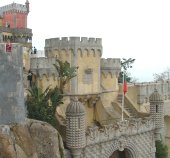
Pena National Palace
Flea Market
Lisbon
The flea market runs every Tuesday and Saturday from sunrise to 12 noon. This is where you will find all you could want. Lisbon’s "Feira da Ladra" reminds foreigners of Paris’s flea market and attracts crowds looking for that second-hand and new item bargains.
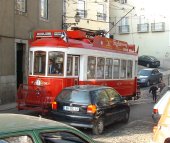
Lisbon
Gulbenkian Foundation
Lisbon
Several annual events are made by this Foundation throughout the year (ACARTE Festival; Great World Orchestras cycle; Antique Music cycle; Ballet; Festival of contemporary music) including series of concerts with some of the world’s most prominent chamber orchestras, dance groups, contemporary music, classical concerts performed by the most prestigious guest soloists.
musica@gulbenkian.pt
Carnival
9 - 12 February
Carnival festivities throughout all of Portugal with spectacular and colorful parades of costume, namely in Lisbon, Loulé, Nazaré, Torres Vedras, Ovar, Mealhada, Viana do Castelo, Sines, Alcobaça and Funchal.
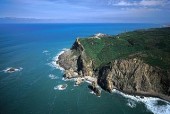 Cabo da Roca
Fantásporto do Porto
Porto - February
International cinema festival. Currently considered one of the most important festivals of cinema in the world. Fantasporto began in 1981 as "Mostra de Cinema Fantástico", turning into the most progessive and talked about cultural event in cimena and theater in Portugal.
Holy Week Festivities
(Festividades da Semana Santa), March
To the north, particularly noteworthy in Braga (a citadel of Christianity when most of Portugal was Moorish and still the ecclesiastical capital) and in Ovar and Póvoa de Varzim. The most important events take place on Holy Thursday and Good Friday when the imposing parades pass through the streets.
Flower Festival
Funchal, Madeira - April
On the 13th, the traditional wall of hope festivities and the 14th is the breathtaking grand parade of Madeira’s capital with thousands of different types of flowers leaving behind the perfumed scent on the streets they pass.
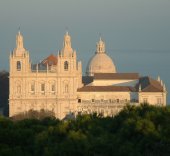 Lisbon
Bullfight Season
Lisbon - May
The season runs through September with fights every Thursday evening and Sunday afternoons in the Campo Pequeno bullring. In Portugal, the bulls are tackled and wrestled to a standstill, but not killed in the arena.
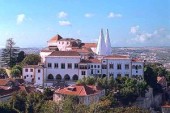 Sintra Palace
Pilgrimage to Fátima
Fátima - May
Fátima is about 100 km north of Lisbon. The Fátima Sanctuary is a pilgrimage site for millions of Catholics from around the world and a place of devotion for most Portuguese people. This sanctuary is one of the most important Marian sites, as Lourdes in France and Chestochowa in Poland. On the 12th there is a candlelight procession and on the 13th is the most important day when devotees and pilgrims from around the world congregate at the sanctuary to mark the anniversary of the first apparition of the Virgin Mary to the shepards in 1917.
rtleiria.fatima@mail.telepac.pt
Portugal’s National Day and Camões Day, 10 June
Held throughout all of Portugal. This day celebrates Portugal’s independence, as well as, its epic poet, Luís Vaz de Camões, who told the story of the nautical discoveries in ‘Os Lusíadas’ in 1572. This day has emphasis on cultural events with traditional celebrations.
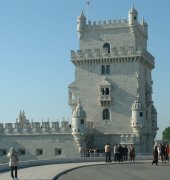 Tower of Belem
Sintra Music Festival, June - July
One of Portugal’s most prestigious summer festivals of serious music. The World Heritage Village of Sintra (about 20 minutes from Lisbon) hosts a stage for a series of concerts and recitals by major orchestras, ensembles and performers from Portugal and abroad. Leading musicians perform at the Royal Palace in Sintra and Queluz and also includes Ballet nights in Seteais.
Red Waistcoast Festival
(Festas do Colete Encarnado)
Vila Franca de Xira - July
This feast was named after the traditional costumes of the ‘Ribatejo’ horsemen. This fair includes the running of the bulls through the streets, regional folk dances competitions of the ‘campinos’ (cowboys), and bullfights. The highlight is Saturday night when the town parties until daybreak.
National Gastronomy Festival
Santarém - October
One of the biggest gastronomical festival featuring traditional and regional foods of the entire country accompanied by Portuguese wines. Feast on the best cuisine while enjoying the traditional folklore music that Portugal has got to offer.
|